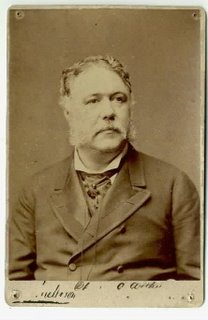Chester Alan Arthur

"If Arthur's goal in life was to grow rather splendid facial hair and leave plenty of room in the history books for the achievements of other men, then his presidency can be ranked a sterling success." -- Bill Bryson.
When Chester Alan Arthur (born on this day in 1829 in North Fairfield, Vermont) was elected Vice President of the U.S. in 1880, it was the first time he had ever stood for public office -- which might not have been unusual had he been a military hero or even a successful diplomat. He was neither; instead, he was a New York lawyer who, in 1855, had successfully represented a black woman in a landmark case that led to the desegregation of public transportation in New York City; a "Stalwart" Republican, who had been the recipient of Stalwart political patronage, having been appointed to the lucrative position of Collector of import duties at the Port of New York (1871-78); and otherwise, an amiable, charming raconteur.
In the chaotic Republican National Convention of 1880, as moderate, anti-patronage Republican James A. Garfield eventually received the Presidential nomination, the Stalwarts, led by Roscoe Conkling, demanded that Garfield's running mate be chosen from among them. Garfield's first choice among them, Levi Morton, declined, and Garfield's lieutenants settled on Arthur, who accepted over Conkling's (perhaps jealous) objections.
Arthur became President following Garfield's death from an assassin's bullet, and to the surprise and anger of the Stalwarts, Arthur supported the Pendleton Act, the law which created the modern civil service system, effectively putting an end to Stalwart patronage. Having alienated the Stalwarts, Arthur had no base of support for re-election, and retired to his law practice at the end of his single term in 1884. He died on November 18, 1886 in New York City.
Categories: US-Presidents





0 Comments:
Post a Comment
Subscribe to Post Comments [Atom]
<< Home